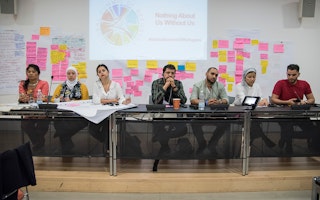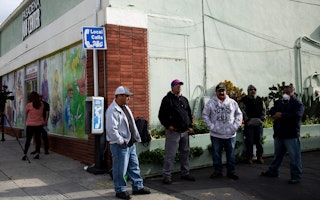How Will Immigration Reform Value America’s Immigrant Families?
By Mee Moua
Early last week, the Senate’s Gang of Eight released its immigration reform bill, the Border Security, Economic Opportunity, and Immigration Modernization Act of 2013. It comes on the heels of the Rally for Citizenship the week before, when thousands convened in Washington, D.C. to rally for immigration reform. Asian American voices joined Latino, African, and Caribbean voices in the call for reform. With the Capitol’s lawn empty, we’ve turned our attention to the immigration bill, and the core changes to family immigration, and the potential impact on Asian American, Latino, African, and Caribbean immigrant families.
Four and a half million Americans are waiting to be reunited with family. Asian, Latino, African, and Caribbean families are trapped in decades-long backlogs, experiencing inhumane wait times. While wait times and the number of visas granted vary, all immigrant groups across the board rely heavily on family-based visas to reunite our families.
Family immigration is a key issue for Asian Americans. As the fastest-growing minority group in the United States, Asian Americans, many of whom came to America to reunite with family members, compose 6 percent of the population. In 2012 alone, approximately 86 percent of visas issued for Asian nations were family-based.
Additionally, Asian-American citizens sponsor approximately one-third of all family-based visas. As 1.8 of the 4.5 million in the backlog are from Asian countries, Asian Americans are disproportionately affected by backlogs, which can last up to 23 years.
Similarly, three-fourths of visas issued for African immigrants were family-based. Among Caribbean families, 99 percent of visas issued were family-based. Haiti and Jamaica combined have almost 124,000 loved ones waiting in line, some for up to 12 years.
The conversation around Latino immigrants has largely focused on pathways to citizenship and border security, but 1.5 million Latinos are impacted by family immigration, making up one-third of the backlog, with some waiting as long as 20 years for reunification.
A lot can happen in 20 years. Children who were originally petitioned as minors become adults, thereby putting them in a different line that can be longer. Take for example, Meeran Mahmud, a staff attorney at our Los Angeles affiliate. When Meeran’s family came to the U.S., they had to leave behind her older sister because she turned 22 before her visa approval. Their petition was filed in 1986. Meeran’s sister awaits her visa and turns 40 this year.
Siblings, who may only have each other, live their lives in waiting, as adult sibling petitions are a lower priority and have a longer wait. Such is the case for Angie Kim, age 29. Twenty years ago, Angie and her parents came to the United States to care of her grandparents. After her grandparents passed away, Angie’s family was forced to endure the hardships of living without authorization. When her younger brother was approved for a visa through his stepmother, he petitioned for Angie to remain here. As his sister, however, she must endure the backlog. Under the current system, she will be 42 years old by the time she’s approved.
With these painful stories in mind, we look to this bill’s proposed solutions. Encouragingly, some parts demonstrate that Senate authors have listened. The bill proposes clearing the family visa backlogs over time; reclassifies spouses and minor children of permanent residents, allowing for a faster process; proposes an increase in country caps, helping those in the longest backlogs; and allows U.S. citizens’ parents to bring along their minor children. These are critical provisions for family.
Some pieces have a particular impact on families. First, the bill eliminates the “F4” visa category so that U.S. citizens would not be able to sponsor siblings. It also places an age cap on the “F3” visa category so that U.S. citizens can only sponsor their adult married children 30 years old or younger. Second, it continues to exclude LGBT couples and families from sponsoring their loved ones by not recognizing permanent partners and their families. Third, it does not include a provision to reunite Filipino American World War II veterans, who have had to painfully choose between living in the United States and being with their family in the Philippines.
Finally, the bill prospectively establishes a points-based system that awards points to individuals based on education, language ability, family ties to the United States, and other criteria. As it is currently written, an adult sibling petitioned by a U.S. citizen would receive the same number of points as someone with a master’s degree. Analysis of the bill has yet to determine if this points system could severely undermine family reunification.
Families are the cornerstone of United States immigration policy. From the Mayflower, to Ellis Island, Angel Island, or any modern port of entry, each successive generation came with only hope and their families, and mustered the courage to persevere and contribute to this nation’s success. We must honor this deep-seeded value of family, which is crucial to the progress of this nation.
Asian American Justice Center and Asian American Center for Advancing Justice are grantees of the Open Society Foundations.
Mee Moua is the president and executive director of the Asian American Justice Center, and member of the Asian American Center for Advancing Justice.


